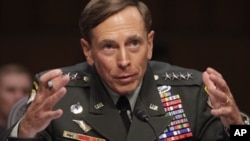The commander of U.S. and NATO forces in Afghanistan says President Barack Obama’s timetable for withdrawing American troops from Afghanistan is more “aggressive” than he and other military officers had counseled, but achievable without undue risks to U.S. objectives. General David Petraeus, Obama’s pick to be the next director of the Central Intelligence Agency, spoke at his confirmation hearing on Capitol Hill.
Members of the Senate Intelligence Committee quickly turned to military matters at Thursday’s hearing, one day after President Obama announced a gradual drawdown of U.S. forces in Afghanistan. Senators were eager to probe the thoughts of the man who oversaw America’s troop surge in Afghanistan, launched 18 months ago.
Petraeus said the president opted for a more-rapid reduction in force strength than he and other commanders had suggested, but added that it was his prerogative to do so.
“That [Obama’s decision] is understandable in the sense that there are broader considerations beyond those of a military commander," said Petraeus. "There has never been a military commander in history who has had all the forces he would like to have.”
The general said the transition from U.S. to Afghan security forces has already begun in some parts of the country.
“We are taking out 33,000 U.S. forces over the course of a 15-month period," he said. "During that time, there will be some 70,000 additional Afghan forces added.”
Petraeus was lauded by senators of both parties. Independent Democratic Senator Joseph Lieberman of Connecticut introduced the general to the committee, noting Petraeus has held top command posts in both Afghanistan and Iraq.
“He is a true American hero who has twice been called upon by our commander-in-chief to assume leadership of a faltering war effort. And twice he led our forces out of the jaws of defeat, on to the path to victory.”
If confirmed, Petraeus would shift from the military to the civilian branch of America’s national security apparatus," said Lieberman. "Historically, the Pentagon and intelligence agencies like the CIA have worked closely together. But analysts say the branches feature different work cultures and mindsets, and operate in distinct manners.
Committee Chairwoman, Democratic Senator Dianne Feinstein expressed confidence Petraeus will make a successful transition to the CIA.
“He has been the commander for a portion of the world where intelligence operations play a key role," said Feinstein. "And he is especially aware of the coordination between military special operations and intelligence covert actions. So he comes to this nomination with a deep familiarity with the intelligence community and the CIA in particular.”
Petraeus admitted his views about current conflicts were formulated during military service. But he pledged that, as CIA director, he would always present the agency’s position and assessments to the president.
The ranking Republican on the committee, Senator Saxby Chambliss, seemed to speak of Petraeus’ confirmation as CIA director as a foregone conclusion.
“I am asked quite often what I think should happen in Afghanistan," said Chambliss. "And my first response is, ‘well, whatever General Petraeus says, that is the direction we ought to go.’ I look forward to a continued close relationship as you assume the duties at the CIA.”
Petraeus would succeed departing CIA Director Leon Panetta, who was confirmed unanimously by the Senate as America’s next secretary of defense. Like Panetta, Petraeus is expected to receive overwhelming support when the full Senate votes on his nomination.
Petraeus: Obama Afghanistan Troop Reduction 'Aggressive'




